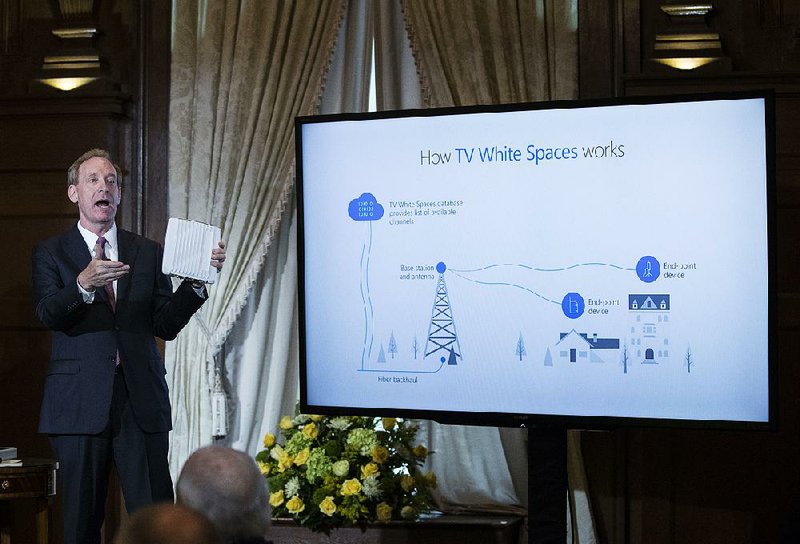For years, Microsoft Corp. focused its efforts to expand high-speed Internet access on developing markets around the world. Now the company is waking up to the problem in its own backyard, after the 2016 presidential election shed light on how far rural parts of America had fallen behind cities in reliable, fast connectivity -- and the challenges that gap poses for residents.
Right now, 23.4 million Americans in rural areas can't get the fast Internet access increasingly needed for tasks like homework, job applications, online medical treatment and remote repairs for farming equipment. Over the years, Microsoft developed and tested its broadband software, along with new chips, devices and antennae, in places including Kenya and Colombia. While it has had some U.S. projects, Microsoft largely overlooked its home country in efforts to bridge the digital divide. That message was underscored in last year's presidential election, when rural voters expressed dissatisfaction and anger over being left out of economic and technological growth, Microsoft President and Chief Legal Officer Brad Smith said.
"It's fair to say the election raised our level of consciousness, as it did for a great many people in the country," Smith said. "It certainly caused us to reflect on the fact that we had been pursuing these projects to a greater degree in rural Africa than rural America. We'd been involved in Asia and other continents more so than in our own country."
Since the election, some tech companies have been among those paying closer attention to the fading of the American Dream for some parts of the country. In some cases, they've found technology made inequality worse for those who can't access it. Facebook co-founder and Chief Executive Officer Mark Zuckerberg has been traveling across the U.S., talking with truckers in Walcott, Iowa; dining with Somali refugees in Minneapolis; and cleaning fish and photographing eagles in rural Alaska.
"It's terrific that Mark has been doing what he's doing. One of the points he's making is a valuable one -- that one of the best ways to learn about a place is to go visit it," Smith said. "At the end of the day we will and should be judged by our deeds and not just our words. That's one of the reasons we have been so focused, not just on learning more, but on doing new things."
One of the biggest ways Microsoft thinks it can make a difference is by bringing speedier online service to these areas -- a program it's calling the Rural Airband Initiative -- and helping other companies do the same. The effort also lets the company tap into a priority for President Donald Trump's administration, whose promise to expand broadband service is part of a $1 trillion nationwide infrastructure plan.
Microsoft has been trying out the system in Charlotte and Halifax counties, two rural regions in southern Virginia. The company covers the costs of capital investments to start the service through local telecommunications companies, many of which are small, sometimes family-owned, and can't afford or risk the up-front investment. Once up and running, the carrier will give Microsoft a share of the revenue. The software maker will plow those funds into connecting a new region. Microsoft itself has no plan to enter the telecom market or to make money directly from this service, Smith said. The company's philanthropy arm, working with the National 4-H Council, will provide digital-skills training locally. Smith declined to say how much Microsoft will spend on the overall plan.
Already Microsoft's efforts in Virginia are making a difference to people like Gwen Harris and her college-bound son Dylan, who just graduated from high school and concurrently earned an associate degree from a community college through a special program at his school. The family had a dial-up Internet connection until switching to a pricey satellite hookup about four years ago. But the system was still too slow and unreliable to download the research Dylan needed for papers or to upload them to professors (Once a critical paper never made it to the instructor.) And the multiple math videos he had to watch ate up the limited data available in their plan. About two years ago, Dylan came home from school with a flyer asking for volunteers to test Microsoft's project. It took a little time to iron out the kinks, said Gwen Harris, but over the past year it has been reliable and fast, making a big difference in Dylan's community college classes.
"I just think it's wonderful that broadband Internet has reached rural America and that our kids can be competitive with the rest of the world," she said. Next year Dylan will attend Old Dominion University, where he plans to study computer science.
Microsoft's own investments will provide access to less than 10 percent of the rural population currently without broadband, so the software maker is asking other companies and the government to get involved. Microsoft will share the technology as well as related patents for free.
For the system to work, Microsoft says the Federal Communications Commission, the U.S. agency that regulates airwaves, needs to allow broader use of the radio spectrum around the nation. The company is asking for three channels. The proposal is just one among competing ideas for using airwave space that's being rearranged as the FCC squeezes TV broadcasters to make more room for wireless data.
SundayMonday Business on 07/17/2017
